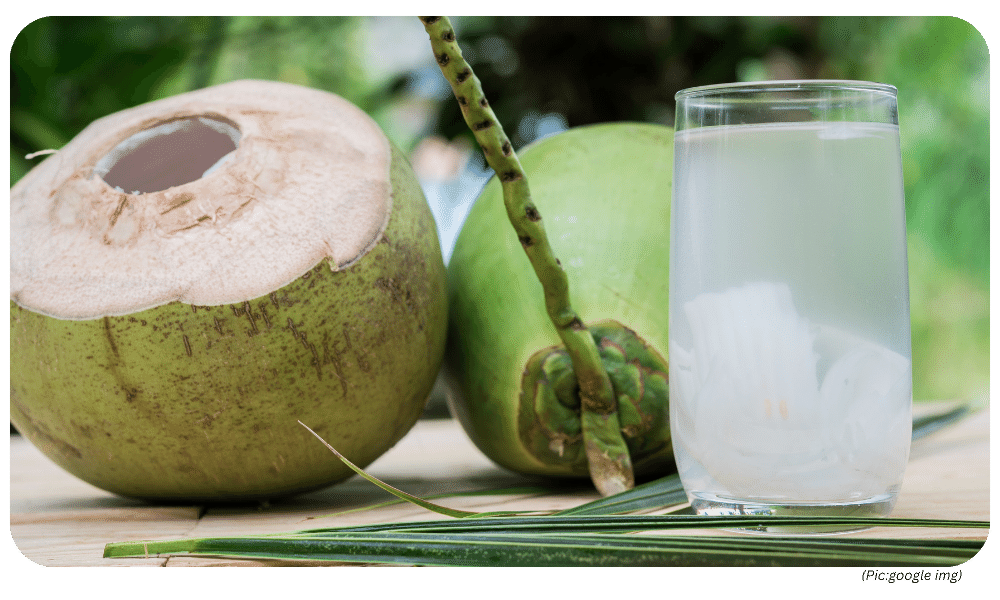The Story of Coconut Water:
Coconut water is a clear, refreshing liquid found inside young, green coconuts. It’s not simply water that seeped into the coconut from the outside; it’s a unique product of the coconut’s own developmental processes. Here’s a breakdown of the journey:
Fertilization: The story begins with the fertilization of a coconut flower.
This process involves two types of gametes (reproductive cells) from the coconut palm:
-
- Male gametes: Two male gametes are released.
- Female gametophyte: The female flower contains the egg cell and other supporting structures.
-
- Double Fertilization: One male gamete fuses with the egg cell, forming a diploid zygote (fertilized egg) which will develop into the embryo of the future coconut. Interestingly, the other male gamete fuses with two special polar nuclei within the female gametophyte. This “triple fusion” event is unique and is termed double fertilization.
-
- Endosperm Development: The result of the double fertilization is the formation of the endosperm, a specialized tissue that nourishes the developing embryo. Initially, the endosperm exists in a nuclear phase, meaning it consists mainly of free-floating nuclei (genetic material) suspended in a watery fluid. This fluid is what we know as coconut water.
-
- Cellular Endosperm Formation: As the coconut matures, the free-floating nuclei in the endosperm undergo cell wall formation. This transforms the previously liquid endosperm into a solid, white flesh we recognize as coconut meat. However, a small cavity filled with coconut water remains in the center of the mature coconut.
Factors Affecting Coconut Water:
-
- Maturity: Coconut water is most abundant in young, green coconuts and gradually decreases as the coconut matures and the endosperm becomes cellular.
-
- Environmental Factors: Factors like temperature and water availability can influence the amount of coconut water produced.
Importance of Coconut Water:
-
- For the developing coconut, it provides essential nutrients and hydration.
- For humans, coconut water is a popular beverage valued for its electrolytes, sweetness, and potential health benefits.
Conclusion:
-
- Coconut water is a fascinating product of the unique double fertilization process and the developmental stages of the coconut. Although the amount diminishes as the coconut matures, it remains a refreshing and potentially health-promoting beverage enjoyed worldwide.
What is the contribution of coconut to India and where is it grown?
Coconut palms are grown extensively along the coastal regions of India, particularly in the states of:
-
- Kerala
- Tamil Nadu
- Andhra Pradesh
- Karnataka
These states account for over 90% of India’s total coconut production, making India the world’s leading producer of coconuts, contributing roughly 34% of the global production.
Here’s a breakdown of the contribution of coconuts to India:
-
- Employment: The coconut industry is a major source of livelihood for millions of people in India, directly and indirectly employing over 12 million people involved in farming, processing, and allied activities.
-
- Income Generation: Coconut cultivation provides a steady income for farmers and contributes significantly to the rural economy. Besides the fruit itself, other products like coir fiber and toddy also generate revenue.
-
- Exports: India is a major exporter of coconuts and coconut products like coir fiber, desiccated coconut, and coconut oil. These exports contribute valuable foreign exchange to the country’s economy.
-
- Industrial Raw Material: Coconut plays a vital role in various industries. The coir fiber is used in making ropes, mats, brushes, and other eco-friendly products. Coconut oil has numerous industrial applications besides being a cooking oil.
-
- Food and Beverage: Coconut water, a natural and refreshing beverage, is enjoyed domestically and exported worldwide. Coconut flesh is used in curries, chutneys, sweets, and various other culinary preparations.
-
- Nutritional Value: Coconut water is a rich source of electrolytes and minerals, making it a popular rehydrating drink. Coconut flesh is a good source of dietary fiber and healthy fats.
Overall, coconut cultivation plays a significant economic and social role in India, supporting livelihoods, generating income, and contributing to the country’s industrial and culinary landscape.







0 Comments